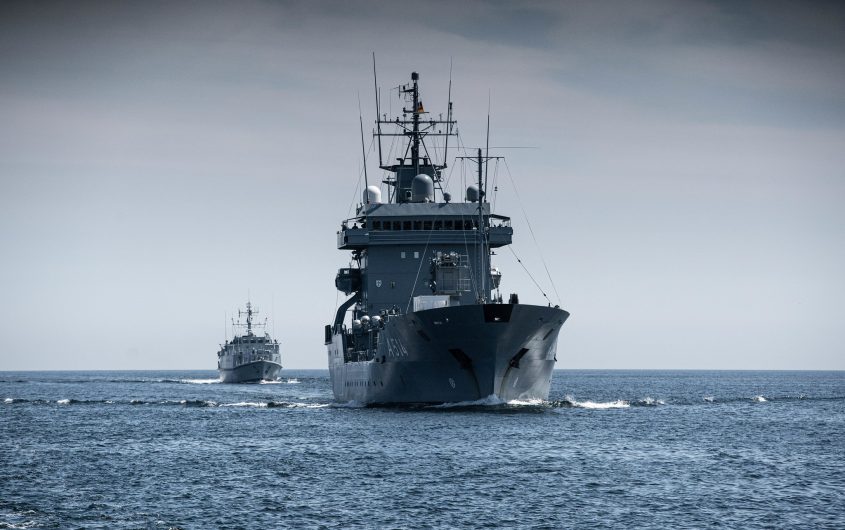
NATO via Flickr
The Transatlantic Relationship in a World at Sea: Navigating the Partnership for the Next Decade

Hendrik W. Ohnesorge
University of Bonn
Dr. Hendrik W. Ohnesorge is Managing Director and Research Fellow at the Center for Global Studies (CGS)/Chair in International Relations at the University of Bonn. His latest book is entitled “Soft Power: The Forces of Attraction in International Relations” (Springer International).

James D. Bindenagel
University of Bonn
James D. Bindenagel is a retired U.S. Ambassador, Henry-Kissinger-Professor (Emeritus) at Bonn University, and Senior Non-Resident Transatlantic Fellow at the German Marshall Fund of the United States. He has published: Germany: From Peace to Power? Can Germany Lead in Europe without Dominating it? (2020) and International Sicherheit im 21. Jahrhundert, Deutschlands Verantwortung (2015), both published by V&R Bonn for Bonn University.
As the 2020 presidential election draws closer, both pundits and politicians, including Democratic presidential candidate Joe Biden, have repeatedly termed it “the most important election of our lives.” Superlatives are legion in politics, and pundits have pronounced the preeminent importance of nearly all presidential elections as each Election Day approached. This November 3, 2020, however, the claim is realistic.
The outcome of the election will have vast ramifications for the future of the United States, both domestically and in its foreign relations. Domestically, the very fabric of the national canvas is at the breaking point with almost unprecedented divisiveness and polarization. Internationally, American reliability in the conduct of foreign affairs, towards partners and rivals alike, has increasingly given way to unpredictably that has undermined trust in American commitments.
The election will determine whether the last four years were an aberration from the post-World War II Pax Americana consensus. It will test whether widely-shared American interests and values are best served and protected by actively engaging with the world, in times of relative calm or in times of heavy seas.
Rising and revisionist powers around the world are pursuing their interests and making the best of these uncertainties to reach their very own objectives. America’s traditional allies seem to be at a loss as to how to deal with an increasingly unreliable America. To be sure, this disruption cannot be blamed entirely on the United States alone, nor even on the incumbent in the White House.
Instead, Europe has for long relied too comfortably on both the protective shield and the guiding hand of the United States of America, even in matters closer to home—from the Balkan Wars of the 1990s to the Libya Intervention in 2011 to today’s Syrian Civil War. After the end of the Cold War, Luxembourg’s foreign minister Jacques Poos declared that “the hour of Europe has dawned.” Until today, European leaders all too often let this hour pass. Consequently, the United States is confronted with the charge of being power-obsessed (“machtbesessen”), but Europe will also have to cope with the reproach of being power-forgotten (“machtvergessen”), with reference to the conceptual pair coined by German scholar Hans-Peter Schwarz thirty-five years ago.
Current times are both ripe, if not predestined, to re-invent the transatlantic partnership for the decades ahead. Both sides of the Atlantic will have to realize that ever-closer cooperation on a variety of subjects—from security issues, both traditional and novel, to economics and trade, to climate change and global pandemics—is vital to manage a world beset with such challenges. If the transatlantic partners fail to get their act together, others will also seek to fill the leadership vacuum. The liberal world order, as we know it today, will falter unless Europe accepts the burden shift following years of benign neglect. The banality of good times has passed, and it is in Europe’s best interest to step up for the liberal world order.
If the transatlantic partners fail to get their act together, others will also seek to fill the leadership vacuum.
On a more positive note, however, both sides of the Atlantic do not have to search for long to find areas of overlapping interests, in which cooperation will be beneficial for Europe and America—as well as the world at large.
Security Partnership with America
In these times of uncertainty, it is understandable that Europe seeks to reduce its security dependence on the U.S. while sustaining the values of democracy, freedom, the rule of law, and respect for human dignity. “Burden Shifting,” not “Burden Sharing,” the goal of 2 percent of GDP for defense, will define the new normal in transatlantic relations. As America turns more attention to Asia, Europeans have begun to accept the shifting burden in Europe. The NATO Logistical Command, deployments under the European Reassurance Initiative, and increasing European military interoperability contribute to a more influential European component in NATO. The strength of the transatlantic alliance will depend more on working together on joint projects as Europe renews its 2006 security strategy, which will contribute to keeping the NATO security guarantee.
Sustaining NATO deterrence in the wake of the proposed withdrawal of U.S. forces from Germany will require enhanced European military capabilities to defend Europe. In the long run, a European continent that can protect its interests and fight its own battles will benefit Washington more than a divided and weak one. Ben Haddad and Alina Polyakova, writing in Foreign Affairs, argue that Europe has a choice to make. It cannot claim the mantle of independent global leadership and at the same time continue to rely on the United States for its security, including in its immediate neighborhood.
American policymakers will have to decide if they prefer a European Union that remains weak in a divided European continent but aligned with American interests and dependent on the U.S. security guarantee. Are U.S. policymakers ready to deal with a forceful and more autonomous partner that will sometimes go against their favored policies?
China: Systemic Rival or Partner for Europe?
Joe Biden outlines his response to the political crisis in a Foreign Affairs article, “Why America Must Lead Again.” He sets out an enormous task in this global power shift for the United States to get tough with China. Biden cites China stealing technology and intellectual property and using subsidies to give its state-owned enterprises an unfair advantage. He suggests the “most effective way to meet that challenge is to build a united front of U.S. allies and partners to confront China’s abusive behaviors and human rights violations, even as we seek to cooperate with Beijing on issues where our interests converge, such as climate change, nonproliferation, and global health security.”
Europe faces an American bi-partisan consensus that relations with China are the overriding concern for foreign policy. China’s systemic rivalry with its growing economic power, and Europe’s struggle for internal unity, combine to make a united front with America a critical issue for Germany and the transatlantic partnership.
Europe has alternatives, including sustaining the transatlantic value-based partnership, partnering with China, or practicing equidistance between the two. As the German-American relationship erodes under President Trump, allies question their reliance on the United States. Nevertheless, Europe’s partnering with a systemic rival China is seemingly out of the question. The EU has demonstrated that democracy and open markets can manage the pandemic’s impact on the economy equally as well as authoritarian states like China, even if centralized power structures can shut down entire cities. Does then an equidistance strategy, given growing European economic dependence on China, maintain European unity and increase its influence on the two great powers? Not least in view of recent opinion polls, this does not seem likely.
Europe’s Geoeconomic Power
As Europe debates a more autonomous role in the transatlantic partnership, it needs to use its geoeconomic power to balance the relationship. The EU’s influence, both hard and soft power, is in economic strength, data protection, and regulatory rules. Europe can accept more responsibility in cyber and information security to protect democratic processes and hybrid threats. With the U.S., it could create investment programs in research and development, such as in an alternative to Huawei’s 5G and other digitalization projects. A united European Union with political and social cohesion could fill the current transatlantic leadership vacuum with its strategic vision.
A united European Union with political and social cohesion could fill the current transatlantic leadership vacuum with its strategic vision.
The EU bears a historical responsibility of determining the fate of the transatlantic relationship that is the foundation of security and prosperity in Europe. The EU could join the Transpacific Partnership (TPP) begun under President Obama and hopefully re-joined by Biden. TPP partners can collaborate with the U.S. and others to hold China to international rules. Germany could lead the EU in the reform of the WTO to set and maintain international standards. The EU could offer a TTIP replacement trade negotiation to define and defend its interests in free trade.
A Technological Partnership can advance European capabilities in artificial intelligence, blockchain, cyberwarfare, and military technologies.
The Publics’ Partnership
Without public support, no policy will succeed. If the EU is to become relevant again and take part in reshaping the transforming global order, Germany, as the Union’s central member state, should develop its long-term strategic planning capabilities. Germany should provide strategic leadership in Europe, overcoming hindrances that have blocked its leading role in the past.
On the way to rebalancing the transatlantic relationship, there are severe obstacles to increasing Germany’s leadership role in Europe—the lack of a strategic culture in Germany, an autocratic history (Sonderweg), incoherent/uncoordinated policy formulation with coalition governments (Ressortprinzip), and, as important as anything, a missing public debate about goals, priorities, and guiding principles of foreign and security policy.
To provide remedy, one idea is to form a German Council on Strategic Foresight as an instrument of the parliament that could foster the basis for a strategic debate. By discussing future scenarios and their implications as well as alternative actions before events have occurred, politicians could move beyond crisis management, and open new possibilities. This reorientation would encourage action rather than reaction. At the same time, such debates would inform public opinion, influencing politics without infringing on the policymaking process. A new German strategic culture, one that would focus on trends and their impacts on Europe and international politics, will be better able to anticipate concrete risks and opportunities and seek to avoid surprises in future crises. Germany, alongside its European partners, can initiate long-term strategic planning, maintain unity, and help reverse European irrelevance.
A new German strategic culture, one that would focus on trends and their impacts on Europe and international politics, will be better able to anticipate concrete risks and opportunities and seek to avoid surprises in future crises.
Germany’s place in Europe, as Henry Kissinger wrote decades ago, has for long been at the very core of the German Question (“Deutsche Frage”). Unification resolved the German Question. Today, how can this most prosperous and secure country take the political initiative, and share leadership in Europe to complete the work of European unity without dominating it? The “German Problem,” overcoming reluctance and exercising leadership in Europe, needs to be addressed.
Toward A Soft-Power Partnership?
A promising point of departure in the endeavor for a reinvigorated transatlantic partnership across issue areas resides in strengthened multilateral cooperation between both sides of the Atlantic. First, multilateral cooperation among partners more likely leads to success, simple as that. Tackling global challenges, from climate change to nuclear proliferation to public health issues, alongside partners, thus pooling expertise and resources, seems much more promising than going at it alone, even for the most powerful of nations. Having reliable allies in facing such issues is a crucial hallmark of global leadership. As Nicholas Burns has recently written in Harvard Magazine, “Our NATO allies, as well as Japan, South Korea, and Australia, act as multipliers of American power in the world. They provide a lifeline of military, economic, and political support when we often need it most. They represent the great power differential between the United States and our rivals Russia and China, who can count on no such allies when the chips are down.”
Second, a re-commitment to multilateralism instead of continued adherence to a narrow America First policy would regain valuable U.S. soft power, which has suffered dramatically over the last four years. For example, Joe Biden has promised on his website that “[h]e will not only recommit the United States to the Paris Agreement on climate change—he will go much further than that. He will lead an effort to get every major country to ramp up the ambition of their domestic climate targets.” Biden’s approach would undoubtedly be a change welcomed by European partners. It will also invite cooperation and joint efforts in other issue areas beyond climate change. Not least, it will illustrate to an expectant world public that America is ready to lead and share in its global responsibilities once more.
Substance, style, and personalities are essential for soft power to support U.S. policies.
Substance, style, and personalities are essential for soft power to support U.S. policies. Decision-makers establish trustworthiness and credibility in their political programs and decisions. The political capital which Angela Merkel has created over her fifteen years in office is virtually unprecedented on the world stage. Donald Trump, on the other hand, has significantly contributed to the demise in U.S. soft power with his inflammatory rhetoric, his personal attacks on individuals both foreign and domestic, and not least his precarious relation to science and the truth. While Joe Biden, individually, will not likely restore the resulting loss of trust in America overnight, the much-respected vice president of the Obama years would be a tremendous personal U.S. soft power asset.
Finally, in these times of upheaval and change, long-standing channels of communication and exchange should be strengthened. Cultural, academic, and societal exchange programs have long been crucial contributors to the attractive powers of the United States, drawing the best and brightest to its shores and sending home life-long ambassadors advocating all that is worth admiring in the United States. In a world suffering from COVID-19, these traditional forms of public diplomacy will have to be adjusted and updated. Diplomacy certainly requires creative approaches on both sides, but advances in information and communication technologies have already opened up multiple avenues in that regard. The United States can benefit profoundly from its world-class universities, its vibrant civil society, its free and critical media, and its entertainment industries. America is strong when it, as Edward R. Murrow knew during the heights of the Cold War and McCarthyism, presents a balanced picture of America, warts and all.
In the final analysis, the revitalization of U.S. soft power is not an end in itself. However, Europeans in general and Germans in particular, traditionally wary of an alleged U.S. obsession with hard power, will need to join forces to master the multiple challenges ahead. Soft power allows the United States to strengthen it as a vital pillar of a successful and resilient transatlantic partnership. Additionally, by collaborating with its partners in defense of its values and pursuit of its interests, it will make it possible to address global issues such as pandemics, climate change, terrorism, and other global challenges.
A Most Crucial Election
Given the current myriad global challenges and a unique, simultaneous abdication of American global leadership, the upcoming presidential election is among the most crucial presidential votes. While the obstacles certainly will not go away after January 20, 2021—much less after November 3, 2020—a revitalized, re-invented transatlantic partnership will be vital in addressing them.
Both sides of the transatlantic relationship are joined by long-standing common interests and shared values. While America looks for renewed leadership from the White House, it is also time for Europe to step up to its tasks. The liberal world order, which the United States and Europe formed and defended, has brought decades of peace and prosperity in Europe. As they now seek to revitalize the alliance, American policymakers will look to Europe and decide if there is a European Union that remains aligned with American interests and values. Jointly the United States and Europe face the latest storms. Only together will both sides be able to navigate them successfully in the systemic fluidity of a world at sea.








